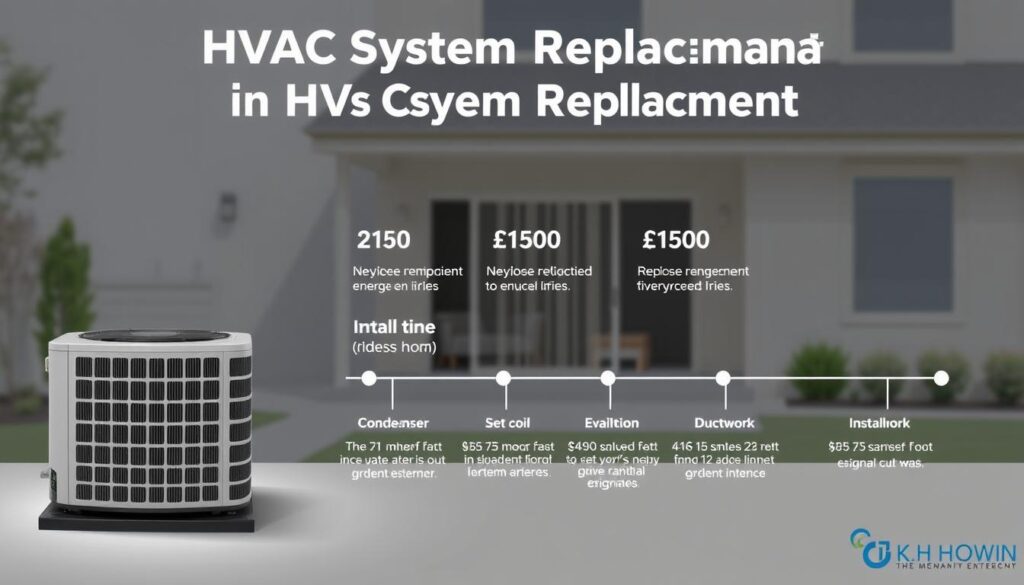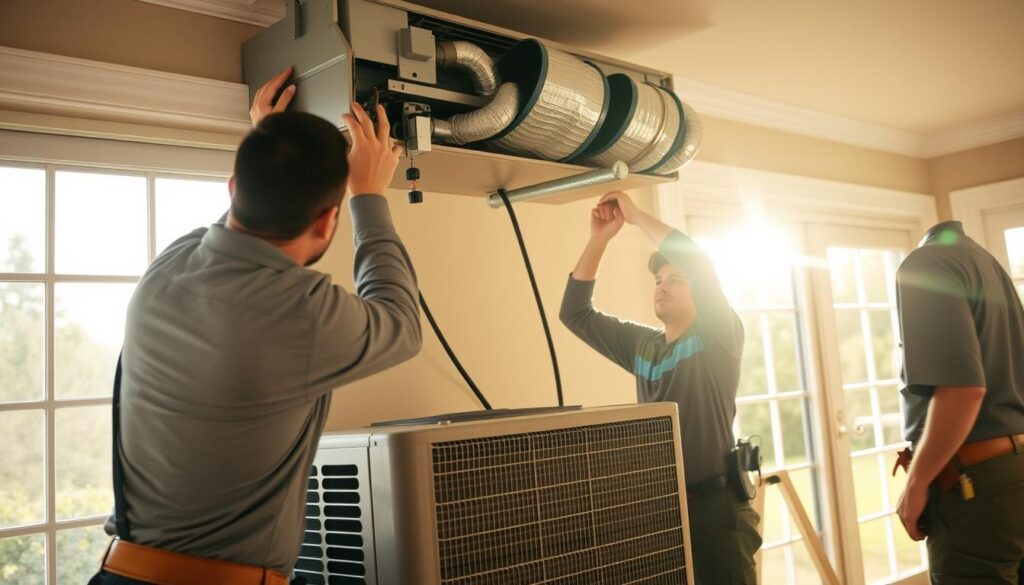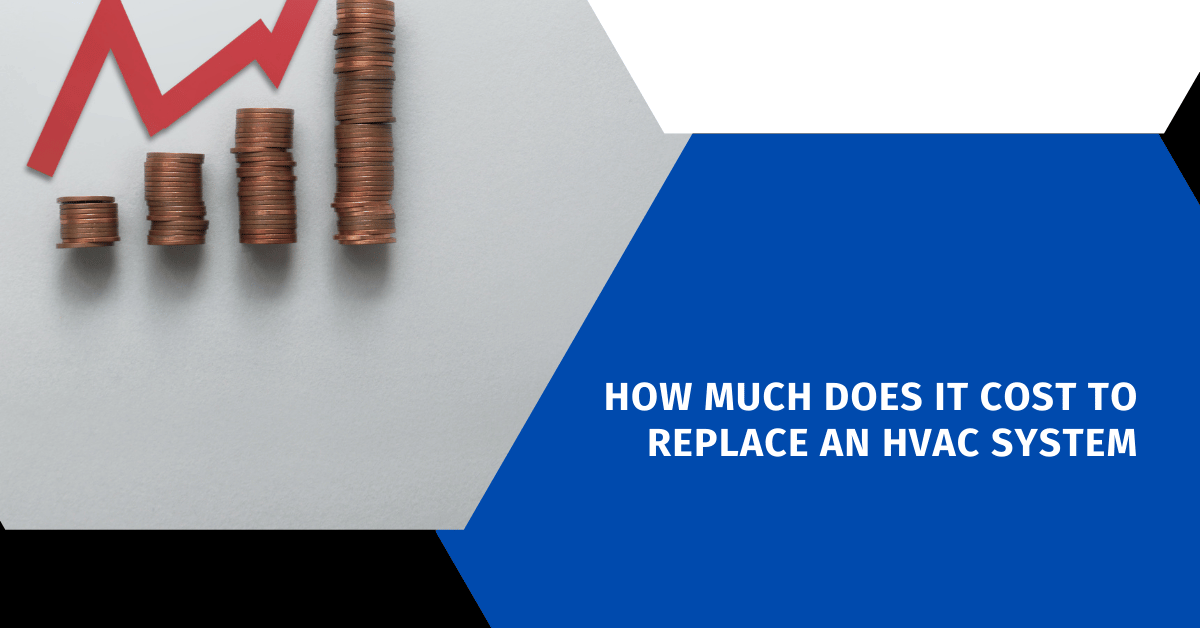Affiliate Disclosure
HVAC Guide Guys is a participant in the Amazon Services LLC Associates Program, an affiliate advertising program designed to provide a means for sites to earn advertising fees by advertising and linking to Amazon.
How Much Does It Cost to Replace an HVAC System? Replacing an HVAC system is a big investment. It requires careful planning and understanding. When looking into the cost, many factors can affect the final price.

Are you curious about the cost of upgrading your home’s heating and cooling system? The average cost to replace an HVAC system can be quite high. It ranges from $8,500 to $20,000 for a central unit.
Your home’s comfort and energy efficiency depend on a smart choice for HVAC replacement. This guide will help you understand system costs. It will assist you in budgeting for this important home improvement project.
Key Takeaways
- HVAC replacement costs typically range from $8,500 to $20,000
- Multiple factors influence the total system replacement expense
- Energy efficiency can impact long-term cost savings
- Home size and climate play critical roles in system selection
- Professional assessment is recommended before replacement
Table of Contents
Understanding HVAC System Basics and Components
Before you look at the cost of a new heating and cooling system, it’s key to know how they work. These systems keep your indoor space comfy by controlling temperature, humidity, and air quality. They’re used in homes and businesses.
Today’s HVAC systems are complex networks of parts that work together to keep your space just right. The cost to replace your heating system can change a lot, depending on the system you pick.
Different Types of HVAC Systems
HVAC technology has many types to fit different needs:
- Forced Air Systems: Most common in homes
- Heat Pump Systems: Great for mild climates
- Radiant Heating Systems: Heats floors evenly
- Geothermal Systems: Good for the environment
Essential Components of Modern HVAC Units
Important parts that affect your system’s price include:
- Thermostat (control center)
- Furnace or heat exchanger
- Condensing unit
- Evaporator coil
- Ductwork system
How HVAC Systems Work Together
Your HVAC system is a network that works as one. The thermostat tells the system when to change the temperature. This starts a chain of actions between the heating and cooling parts. Knowing how they work can help you choose the right system and save money in the long run.
Pro Tip: Investing in a high-quality, energy-efficient HVAC system can lead to significant long-term savings on utility bills.
Average HVAC Replacement Cost Range in 2024
Knowing the average cost for HVAC replacement helps with budgeting. In 2024, homeowners will likely spend between $8,500 and $20,000 for a new HVAC system. The cost for a home air conditioner varies based on several factors.
Here are typical price ranges for different HVAC parts:
- Air conditioning units: $3,500 – $7,500
- Furnace replacements: $2,500 – $6,500
- Heat pump systems: $4,000 – $8,000
- Ductwork installation: $1,500 – $7,000
The overall cost for HVAC replacement depends on your home’s needs. Several factors affect the price:
- Home size
- System efficiency
- Equipment brand
- Installation difficulty
| HVAC System Type | Average Cost Range | Typical Lifespan |
|---|---|---|
| Central Air Conditioning | $3,500 – $7,500 | 10-15 years |
| Complete HVAC System | $8,500 – $20,000 | 15-20 years |
| Ductless mini-split system | $2,000 – $14,500 | 10-30 years |
Pro tip: Always get quotes from certified HVAC pros to find the best deal for your home air conditioner.
Explore Our HVAC Shop
Looking for top-rated HVAC tools, parts, and accessories? Visit our shop and find the perfect solution for your needs.
Visit the ShopFactors That Impact HVAC Installation Expenses
When you’re planning to replace your home’s HVAC system, knowing what affects the cost is key. Several things can change how much you’ll spend on a new heating and cooling setup.
Here are the main things that decide how much you’ll pay for your home’s comfort system:
- Home size and square footage
- System capacity requirements
- Geographic location and climate
- Labor complexity and installation challenges
Home Size and System Capacity
The size of your home affects how big your HVAC system needs to be. Bigger homes need more powerful systems, which can make the cost higher. Experts use a measure called tonnage to figure out system size. Each ton is 12,000 BTUs of cooling power.
| Home Size (sq ft) | Recommended System Capacity | Estimated Cost Range |
|---|---|---|
| 1,000-1,500 | 2-3 Tons | $3,500-$5,500 |
| 1,500-2,500 | 3-4 Tons | $5,500-$7,500 |
| 2,500-3,500 | 4-5 Tons | $7,500-$9,500 |
Geographic Location and Climate Considerations
The weather in your area also plays a big role. Places with very hot or cold weather need stronger systems. This can make the cost go up. For example, the South might need more cooling power, while the North might need more heating.
Labor Costs and Installation Complexity
How easy or hard it is to install your new system can also affect the cost. Things like the state of your ductwork and how easy it is to get to can change labor costs. Older homes might need more work, which can increase the total cost of your new HVAC system.
How Much Does It Cost to Replace an HVAC System Based on Unit Type
When you think about replacing your furnace and AC, knowing the cost differences is key. The cost to replace your central heating system can vary a lot. This depends on the type of unit you pick.
Here are the main types of HVAC units and their typical costs:
- Central Air Conditioning Systems: Costs between $8,500 and $20,000
- Great for cooling your whole house
- Requires the biggest upfront investment
- Heat Pump Systems: Usually costs between $10,000 and $18,000
- Works for both heating and cooling
- Is a good choice for saving energy
- Ductless mini-split systems: Costs about $5,000 to $12,000
- Perfect for smaller areas
- Offers flexible installation options
The cost to replace your central heating system will depend on several things. These include your home’s size, the state of your ductwork, and local installation prices. Older homes might need extra work, which can raise the cost of replacing your furnace and AC.
Pro tip: Always get multiple quotes from certified HVAC pros. This way, you can find the best deal for your needs.
Energy Efficiency Ratings and Their Impact on Pricing
When looking at new heating and cooling systems, knowing about energy efficiency is key. The efficiency of your HVAC system affects both the cost upfront and your savings over time. It’s important to look at these ratings closely.
Energy efficiency in HVAC systems is mainly measured by SEER (Seasonal Energy Efficiency Ratio) ratings. These ratings show how well your system turns electrical energy into cooling power.
Decoding SEER Ratings
SEER ratings go from 13 to 26, with higher numbers meaning better energy use. When you’re looking at prices for upgrading your HVAC, you’ll see that systems with higher SEER ratings cost more at first. But they save you money in the long run:
- Lower monthly energy bills
- Less harm to the environment
- Better home comfort
- Possible tax breaks
Long-Term Cost Benefits of Efficient Systems
Even though high-efficiency HVAC systems might seem pricey at first, the savings are big. A system with a SEER rating of 20 or higher can cut cooling costs by up to 50% compared to older systems.
“Choosing an energy-efficient HVAC system is not an expense, but a strategic investment in your home’s comfort and financial future.”
When you’re looking at prices for new heating and cooling systems, think about the total cost over time, not just the initial price. Systems that use more energy cost less to buy but cost more to run. On the other hand, efficient systems save you money and increase your home’s value.
Explore Our HVAC Shop
Looking for top-rated HVAC tools, parts, and accessories? Visit our shop and find the perfect solution for your needs.
Visit the ShopInstallation Costs and Labor Considerations

When you’re planning to replace your home’s HVAC system, knowing the costs is key. Professional installation affects your total cost. The right team can save you money and ensure your system works well for years.
Labor costs for HVAC installation can be from $500 to $2,500. This depends on several things:
- Complexity of the existing system
- Home square footage
- Ductwork modifications needed
- Accessibility of installation area
- Required electrical upgrades
The cost of replacing your HVAC system varies by location and your home’s needs. Experts usually charge $75 to $250 an hour. Most installations take 1-2 days.
| Installation Complexity | Estimated Labor Hours | Average Labor Cost |
|---|---|---|
| Standard Replacement | 8-12 hours | $600 – $1,500 |
| Complex Replacement | 16-24 hours | $1,200 – $2,500 |
| Minimal Modifications | 4-8 hours | $300 – $1,000 |
Pro tip: Always get multiple quotes and verify technician certifications to ensure quality installation and possible long-term savings.
Brand Comparison and Price Variations
When looking at new heating and cooling systems, knowing about brand differences is key. Different HVAC makers offer unique values that affect your upgrade costs.
Choosing the right HVAC brand means looking at more than just the price. Some brands offer better features and last longer, even if they cost more upfront.
Top HVAC Manufacturers and Their Price Ranges
- Carrier: Premium brand with prices ranging from $5,000-$8,500
- Lennox: Known for high-efficiency units, pricing between $4,500-$7,800
- Trane: Reliable performance, costs from $4,800-$7,200
- Rheem: Budget-friendly options, $3,500-$6,000
Warranty Considerations
Warranty coverage is key for long-term value. Top brands usually offer:
| Manufacturer | Parts Warranty | Labor Warranty |
|---|---|---|
| Carrier | 10 years | 1 year |
| Lennox | 10 years | 1 year |
| Trane | 10 years | 1 year |
| Rheem | 10 years | 1 year |
“Investing in a quality HVAC system is about balancing upfront costs with long-term performance and reliability.” – HVAC Industry Expert
Your home needs, budget, and local climate will help pick the best HVAC brand for your upgrade.
Additional Cost Factors for HVAC Replacement
When you’re looking to replace your home’s air conditioner, there are more costs than just the unit itself. These extra expenses can greatly affect your total budget.
Replacing your HVAC might involve more than just the new system. Key components that can increase costs include:
- Ductwork modification or complete replacement
- Smart thermostat upgrades
- Electrical system updates
- Permit and inspection fees
Ductwork often needs a lot of work during an HVAC replacement. Older homes might have ducts that need a full redesign. This can add $1,500 to $7,000 to your total cost, depending on your home’s size and complexity.
Smart thermostat installations can also add to the cost. Modern thermostats cost between $200 to $500. They help save energy and make your system more efficient. Your HVAC expert can help pick the right one for your needs.
Electrical system upgrades are another important factor. New HVAC systems might need different electrical connections or panel upgrades. These changes can cost between $500 and $2,000, based on your home’s electrical setup.
Pro tip: Always get multiple quotes and ask detailed questions about possible extra costs before starting your HVAC replacement project.
Knowing about these extra costs ahead of time helps you plan better. It keeps you from facing unexpected expenses during your HVAC replacement.
Explore Our HVAC Shop
Looking for top-rated HVAC tools, parts, and accessories? Visit our shop and find the perfect solution for your needs.
Visit the ShopFinancing Options and Payment Plans

Replacing your home’s HVAC system can be costly. But, there are many ways to make it more affordable. Knowing your options can ease the financial stress.
Homeowners can find ways to pay for HVAC upgrades without breaking the bank. With careful planning, this big expense can become a manageable investment.
Available Rebates and Tax Incentives
Energy-efficient HVAC systems come with financial perks:
- Federal tax credits for energy-efficient home improvements
- State-level rebate programs
- Utility company incentives for upgrading to high-efficiency systems
These incentives can cut down your costs. You could save hundreds or thousands of dollars.
Manufacturer Financing Programs
Many HVAC makers have special financing plans to help:
- Zero-interest promotional periods
- Low-interest payment plans
- Flexible monthly payment schedules
When choosing a financing option, compare different offers. Think about your long-term financial goals. Some plans offer extended warranties or extra benefits that add value.
“Smart financing transforms a major expense into a strategic home investment.”
Signs It’s Time to Replace Your HVAC System
Knowing when to replace your HVAC system can save you a lot of money. It’s important to watch your home’s comfort system closely. This helps you decide when it’s time for a new furnace and AC unit.
Here are some signs that it might be time for a new HVAC system:
- Your system is over 10-15 years old
- Repair costs are becoming increasingly frequent
- Energy bills have dramatically increased
- Inconsistent temperatures throughout your home
- Unusual noises during system operation
Age is a big factor in how well your HVAC system works. Older systems use more energy to keep your home warm or cool. If repair costs are close to half the price of a new system, it’s time to replace.
Replacing your HVAC system wisely can prevent sudden breakdowns and save money in the long run. A professional HVAC technician can check your system and suggest the best option.
Pro Tip: Regular maintenance can extend your HVAC system’s lifespan, but eventually, replacement becomes inevitable.
It’s a good idea to get a professional to inspect your system. They can tell you how it’s doing and give you a clear estimate for a new furnace and AC unit.
Seasonal Timing for HVAC Replacement
Choosing the right time to replace your home air conditioner can save you money. Smart homeowners know that timing is key when buying a new HVAC system.
The cost of replacing your HVAC varies with the season. Contractors have different workloads throughout the year. This affects prices and how easy it is to get an appointment.
- Fall Season (Best for Air Conditioning)
- Lower demand for AC installations
- Potential discounts from HVAC companies
- More flexible scheduling
- Spring Season (Best for Heating Systems)
- Reduced workload for heating technicians
- Competitive pricing
- Ample time for installation before summer heat
Timing your HVAC replacement can save you money. Try to avoid the busiest summer and winter months. Prices are usually higher then.
| Season | Potential Savings | Availability |
|---|---|---|
| Fall | 10-15% | High |
| Spring | 8-12% | Very High |
| Summer/Winter | 0-5% | Low |
While timing can cut costs, the most critical thing is your HVAC’s performance. Talk to local HVAC experts to find the best time for your needs and area.
Conclusion
Figuring out the cost to replace an HVAC system involves looking at many factors. It’s not just about the price. It’s about energy savings, comfort, and how well it works over time. By considering the system type, your home’s size, and the local weather, you can find a good balance.
The cost of upgrading your HVAC system can change a lot. But, choosing a high-quality, energy-saving unit is key. It will lower your bills. Also, getting it installed right and keeping it maintained will make it last longer and work better.
When you’re ready to replace your HVAC, look into financing, tax breaks, and rebates. Talk to certified HVAC experts who can give you a plan that fits your home. A good system now can save you money and avoid costly repairs later.
Your goal is to make your home comfortable and energy-efficient without spending too much. This guide will help you understand HVAC replacements better. You’ll be ready to make smart choices for your home.

